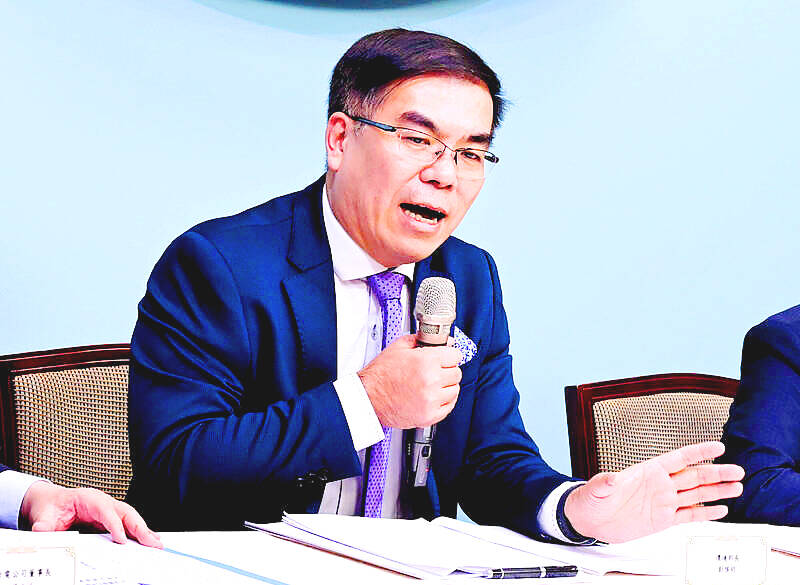The central government would be in charge of environmental impact assessments (EIAs) for hotels, solar plants, and cultural and educational facilities, Minister of Environment Peng Chi-ming (彭啟明) said yesterday, following criticism about the delegation of the responsibility to local governments.
Disputes arose after the ministry last month said it would amend the Environmental Impact Assessment Enforcement Rules (環境影響評估法施行細則) to grant local governments the authority to assess the environmental impact of three types of construction projects: hotels, cultural and educational facilities, as well as solar photovoltaic projects under 30 hectares.
Before a meeting with the legislature’s Social Welfare and Environmental Hygiene Committee yesterday, Peng said in an interview that the three types of EIAs would still be handled by the central government, although hotel projects already entrusted to local governments would remain in their hands.

Photo: Taipei Times
There are 50 to 60 EIA personnel at the local government level across Taiwan’s 22 administrative areas, he said, citing on-site examination results.
While some local governments have been doing a good job, others are facing personnel shortages, Peng said.
As the insufficient EIA capacities of local governments would be harmful to the environment, an overall improvement of the EIA system is necessary, he said.
The ministry has commissioned a non-governmental organization to conduct a full review of the EIA system, which is expected to identify all problems by the end of next year, Peng said.
The ministry would also help local governments to increase personnel for post-EIA supervision and enhance the review mechanisms to make EIAs more transparent, he added.
Department of Environmental Protection Director-General Hsu Su-chih (徐淑芷) yesterday said construction projects that could have a higher environmental impact in regions like national parks would be reviewed by the central government, while local governments would take over cases with less environmental impact.
Asked about the potential use of nuclear power, Peng said that the UN has yet to reach a consensus on this topic, adding that pro-nuclear initiatives launched by several countries on the sidelines of COP28 last year were not included in the official meeting minutes.
Innovative nuclear applications such as nuclear fusion and small modular reactors have yet to be fully developed and their commercial transfer remains to be seen, he said.
Taiwan must develop diverse energy sources instead of relying on a single energy source, and nuclear energy is just one of many options, Peng said.
An EU report at COP29 found that green energy accounts for up to 45 percent of global energy usage, which makes it the most prevalent type, Peng said, adding that nuclear power could not solve all energy problems.

Chinese Nationalist Party (KMT) Chairman Eric Chu (朱立倫), spokeswoman Yang Chih-yu (楊智伃) and Legislator Hsieh Lung-chieh (謝龍介) would be summoned by police for questioning for leading an illegal assembly on Thursday evening last week, Minister of the Interior Liu Shyh-fang (劉世芳) said today. The three KMT officials led an assembly outside the Taipei City Prosecutors’ Office, a restricted area where public assembly is not allowed, protesting the questioning of several KMT staff and searches of KMT headquarters and offices in a recall petition forgery case. Chu, Yang and Hsieh are all suspected of contravening the Assembly and Parade Act (集會遊行法) by holding

PRAISE: Japanese visitor Takashi Kubota said the Taiwanese temple architecture images showcased in the AI Art Gallery were the most impressive displays he saw Taiwan does not have an official pavilion at the World Expo in Osaka, Japan, because of its diplomatic predicament, but the government-backed Tech World pavilion is drawing interest with its unique recreations of works by Taiwanese artists. The pavilion features an artificial intelligence (AI)-based art gallery showcasing works of famous Taiwanese artists from the Japanese colonial period using innovative technologies. Among its main simulated displays are Eastern gouache paintings by Chen Chin (陳進), Lin Yu-shan (林玉山) and Kuo Hsueh-hu (郭雪湖), who were the three young Taiwanese painters selected for the East Asian Painting exhibition in 1927. Gouache is a water-based

Taiwan would welcome the return of Honduras as a diplomatic ally if its next president decides to make such a move, Minister of Foreign Affairs Lin Chia-lung (林佳龍) said yesterday. “Of course, we would welcome Honduras if they want to restore diplomatic ties with Taiwan after their elections,” Lin said at a meeting of the legislature’s Foreign Affairs and National Defense Committee, when asked to comment on statements made by two of the three Honduran presidential candidates during the presidential campaign in the Central American country. Taiwan is paying close attention to the region as a whole in the wake of a

OFF-TARGET: More than 30,000 participants were expected to take part in the Games next month, but only 6,550 foreign and 19,400 Taiwanese athletes have registered Taipei city councilors yesterday blasted the organizers of next month’s World Masters Games over sudden timetable and venue changes, which they said have caused thousands of participants to back out of the international sporting event, among other organizational issues. They also cited visa delays and political interference by China as reasons many foreign athletes are requesting refunds for the event, to be held from May 17 to 30. Jointly organized by the Taipei and New Taipei City governments, the games have been rocked by numerous controversies since preparations began in 2020. Taipei City Councilor Lin Yen-feng (林延鳳) said yesterday that new measures by